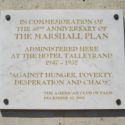After the financial collapse of the so-called “commonwealth” regime of territorial government and two apocalyptic hurricanes, Puerto Rico is faced with more than an immediate short term humanitarian crisis. Long term chronic poverty and civic disorder threatens erosion of social and cultural cohesion for the people of the island.
In 1947 the old world order of Europe was in shambles and 16 nations were struggling to restore order amid the devastation left by WWII. The U.S. determined it was in the American national interest to help with recovery not only for our wartime allies, but also for nations that had remained neutral, and even formerly hostile enemy nations.
The Marshall Plan goal was to fuel recovery — investment in free enterprise that alone could restore an enhanced social order, robust standard of living and quality of life better than before the war. At its core the real Marshall Plan was a political status and economic policy reform program. Its goal was to create a pro-business culture based on government, commercial, trade, financial and investment policies that were friendly to free enerprise.
If the legacy of the Marshall Plan is to be understood as more than a political cliche, it must be recognized that it was part of a much larger multilateral U.S. and European program of cooperation to promote democracy and private sector led wealth production as the political status and economic model for justice, peace and prosperity in Europe.
That cooperation policy involved massive U.S. foreign aid to Europe, but it also supported the U.S. model of a political economy based on uniform federal law, equal footing of all states to compete and participate in the national economy and the political life of the nation.
The Marshall Plan As Political Theater
Most of the post-WWII Marshall Plan funding went to major allies like Britain and France, and countries like Ireland that had been neutral in the war. Because U.S. companies were reluctant to invest in Europe, the Marshall Plan provided grants and loans for projects in which U.S. companies could participate with federal guarantees against some political risks.
But Puerto Rico is not a foreign country.
Using the term “Marshall Plan” might just be good theater. It reminds us of the good deeds of the U.S. in the past instead of putting support of Puerto Rico in terms like “bailout” or “relief.” It also ignores the history between the United States and Puerto Rico:
- Congress used tax gimmicks as incentives for U.S. corporations to prop up the less than equal and less than democratic “commonwealth” regime in Puerto Rico.
- Elimination of tax shelters that treated Puerto Rico as a foreign country contributed to economic slowdown in Puerto Rico.
- Treating the U.S. territory like a foreign nation also caused the U.S. military to leave Puerto Rico a decade ago, taking 6,000 good jobs and $300 million out of the local economy.
- The loss of military presence limited the capacity of the federal government to deal with logistics of emergency relief efforts after the hurricanes and cost lives.
- Congress has never delivered on the promise of equal rights in Puerto Rico as they did in Hawaii and Alaska.
America’s aid to Europe was an overall success story. We applaud the intentions of Senators Sanders and Warren to provide much-needed funds for Puerto Rico. But the reality is a plan that provides just enough economic support to sustain a less perfect form of union under territorial status, with a lower quality of life than Puerto Rico could achieve under statehood – or possibly even separate nationhood!
The real political risk for Americans in Puerto Rico is continued inequality. Puerto Rico deserves a level playing field for participation in the national economy on an equal footing with citizens in the 50 states.








No responses yet